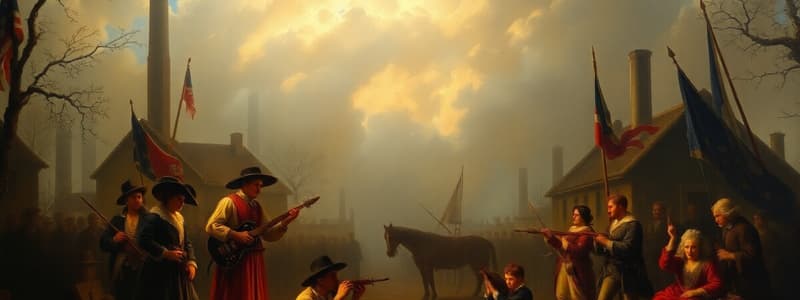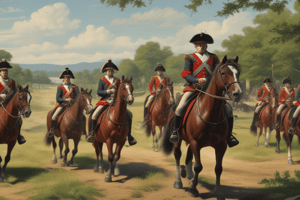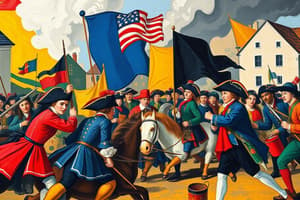Podcast
Questions and Answers
What was the main reason colonists protested during the Boston Massacre?
What was the main reason colonists protested during the Boston Massacre?
Colonists protested against taxes on imported goods, particularly tea.
What actions did the Sons of Liberty take against the Stamp Act?
What actions did the Sons of Liberty take against the Stamp Act?
They organized the burning of stamps and attacked stamp officials.
What was a consequence of the Boston Tea Party on British policies?
What was a consequence of the Boston Tea Party on British policies?
The British government imposed the Intolerable Acts as a consequence.
Which act was a direct response to colonial dissatisfaction and included taxation without representation?
Which act was a direct response to colonial dissatisfaction and included taxation without representation?
How did the Seven Years' War contribute to the American Revolution?
How did the Seven Years' War contribute to the American Revolution?
What slogan did the Sons of Liberty adopt to express their opposition to British taxation?
What slogan did the Sons of Liberty adopt to express their opposition to British taxation?
What was the impact of the Navigation Acts on colonial trade?
What was the impact of the Navigation Acts on colonial trade?
What was the immediate outcome of the Boston Massacre?
What was the immediate outcome of the Boston Massacre?
What was the significance of the Boston Tea Party in the context of American colonial resistance?
What was the significance of the Boston Tea Party in the context of American colonial resistance?
How did the Intolerable Acts contribute to the tension leading up to the American Revolution?
How did the Intolerable Acts contribute to the tension leading up to the American Revolution?
What role did the Seven Years' War play in the American Revolution?
What role did the Seven Years' War play in the American Revolution?
What were the Navigation Acts, and how did they affect colonial trade?
What were the Navigation Acts, and how did they affect colonial trade?
In what ways did the Boston Massacre influence colonial sentiments towards Britain?
In what ways did the Boston Massacre influence colonial sentiments towards Britain?
What were the key events of the Boston Tea Party and its significance?
What were the key events of the Boston Tea Party and its significance?
Describe the circumstances surrounding the Boston Massacre.
Describe the circumstances surrounding the Boston Massacre.
What impact did the Navigation Acts have on colonial trade?
What impact did the Navigation Acts have on colonial trade?
How did the Seven Years' War contribute to growing tensions between America and Britain?
How did the Seven Years' War contribute to growing tensions between America and Britain?
Explain the significance of the various taxes imposed on the colonies after the Seven Years' War.
Explain the significance of the various taxes imposed on the colonies after the Seven Years' War.
What role did smuggling play in colonial response to the Navigation Acts?
What role did smuggling play in colonial response to the Navigation Acts?
In what ways did the American Revolution address issues stemming from the Seven Years' War?
In what ways did the American Revolution address issues stemming from the Seven Years' War?
What were the underlying causes of the American Revolution related to British policies?
What were the underlying causes of the American Revolution related to British policies?
Flashcards
Stamp Act
Stamp Act
Americans had to pay for documents to be stamped by government officials.
Sons of Liberty
Sons of Liberty
A group that protested against the Stamp Act by burning stamps, and attacking officials.
Boston Massacre
Boston Massacre
A conflict between American protestors and British soldiers, resulting in the death of five protestors.
Boston Tea Party
Boston Tea Party
Signup and view all the flashcards
No taxation without representation
No taxation without representation
Signup and view all the flashcards
King George III
King George III
Signup and view all the flashcards
American Colonies in 1760
American Colonies in 1760
Signup and view all the flashcards
Governor's role
Governor's role
Signup and view all the flashcards
Causes of American Revolution
Causes of American Revolution
Signup and view all the flashcards
Navigation Acts
Navigation Acts
Signup and view all the flashcards
Seven Years' War
Seven Years' War
Signup and view all the flashcards
British Debt
British Debt
Signup and view all the flashcards
Colonial Population Growth
Colonial Population Growth
Signup and view all the flashcards
Colonial Settlements (1750)
Colonial Settlements (1750)
Signup and view all the flashcards
Quartering Act
Quartering Act
Signup and view all the flashcards
Sugar Act
Sugar Act
Signup and view all the flashcards
American Revolution Turning Point
American Revolution Turning Point
Signup and view all the flashcards
British Surrender
British Surrender
Signup and view all the flashcards
American Independence
American Independence
Signup and view all the flashcards
American Revolution Impact (1)
American Revolution Impact (1)
Signup and view all the flashcards
American Constitution
American Constitution
Signup and view all the flashcards
Study Notes
American Revolution Overview
- Key learning objective: examine causes, course, and consequences of a pre-20th-century revolution (American or French, student choice)
- Choice of revolution: American Revolution OR French Revolution
- Learning intentions focus on understanding the causes, course, and outcomes of the American Revolution
- Learning intentions also cover the nature of history and the job/role of a historian
America in 1750
- 13 colonies in North America
- Ruled by Great Britain
- Each colony had its own assembly and governor, representing the King or Queen of England
- Founding on the idea of Thirteen Colonies
Population Growth (1750-1770)
- Increased rapidly from 1,170,760 to 2,148,076
- Factors driving growth: high birth rate, low death rate, and immigration (particularly Ulster)
Key Towns
- Five prominent towns: Philadelphia, New York, Boston, Newport, and Charleston
- Most colonists lived on farms (plantations).
Causes of the American Revolution
- Navigation Acts: American products (sugar, cotton, tobacco) could only be sold through England; increased wealth for England and smuggling by Americans
- Seven Years' War: Expensive war between Britain and France, including American participation; increased British national debt; leading to increased taxes on Americans
- Taxation: British imposed taxes on colonists for various imports (e.g., sugar and stamps) without colonial representation. Quartering Act required colonists to provide housing and supplies to British soldiers.
- Boston Massacre: British soldiers fired upon protestors in Boston; and resulted in 5 fatalities
- Boston Tea Party: British government allowed the East India Company to sell tea directly to Americans without tax. American tea importers were levied a tax. Colonists dressed as Native Americans dumped 342 crates of tea into Boston Harbor as a protest
Course of the War
-
Lexington and Concord: 1775, British troops marched to Concord to destroy American weapons and ammunition; British were forced back to Boston.
-
Battle of Bunker Hill: Americans lost, but fought bravely, inspiring further resistance
-
Common Sense: 1776, Thomas Paine published Common Sense, urging colonists to pursue independence.
-
Second Continental Congress: Appointed George Washington as commander-in-chief of the Continental Army.
-
Declaration of Independence: July 4, 1776, Continental Congress passed the Declaration of Independence, written by Thomas Jefferson.
-
War Continues: Victories for both sides; British defeat at Yorktown in 1781
-
Treaty of Paris: 1783, Britain recognized American independence, creating the United States.
Consequences of the Revolution
- Formation of the US: Birth of the United States of America
- Expansion: Expansion westward to Mississippi River
- Conflicts: Conflicts with Native Americans emerged, due to expansion into their territories.
- Creating a Federal Government: The American Constitution created a federal government with three branches: legislative, executive, and judicial.
Studying That Suits You
Use AI to generate personalized quizzes and flashcards to suit your learning preferences.




